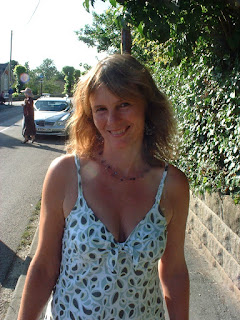Angeline Roche stood at her ironing board, steam
rising, moving her hips to the music of her favourite band. She liked British and American music. Something with a beat, with a little life. Something to make her dream.
Adrian was visible in the lounge, playing FIFA on
his Playstation. She whizzed the
iron efficiently over her customers’ shirts, trousers, jackets and dresses;
folded them quickly and placed them into the special bags she provided,
labelled with the appropriate names.
She never got the clothes mixed up, never had any complaints about her
work or her prices, which were higher than they should be, her friends told
her. Her customers were wealthy, they
could afford to pay more, and they were grateful for her service, always
complimenting her and tipping her generously when she dropped the clothes off
and collected a new load.
Angeline Roche was a businesswoman, registered as
self employed and paying enough of her taxes to escape scrutiny.
By lunchtime, she had finished. Guy arrived home at twelve fifteen as a
rule, but today it was after twelve thirty when he came in whistling, shouting
out to her that he was home, as though she may not have heard him. The table was set and Adrian carried the
dishes, setting them down on the mats.
‘What’s up, you terror?’
‘I beat PSG!
And I bought Ronaldo!’
‘What! Spending again? How much?’
‘Fifty million euros!’
‘Sit down, Adrian.
The food is ready,’ said his mother.
Guy winked, and the boy did as his mother asked.
‘How is the washer-woman today?’ He came up behind her and put his arms
around her waist.
‘Be careful!’
‘Mmmm! Smells good.
What is it?’
Angeline swiped at him with the teacloth then passed
him the fish to take to the table.
When they were seated, she asked him where he had
been to make him late.
‘Eat your salad, Adrian!’ she said, waiting for her
husband’s response.
‘I went to see the Englishwoman, about lessons.’
‘Oh!’
‘She said she would teach me, so I took her up on
it. The hotel Bellevue is advertising
for a groundsman.’
Guy’s non sequitur hung in the air as his wife
finished her salad and served out the fish with peas.
‘Have you got time to play a match, Papa? Before you go back?’ Adrian took the plate his mother offered him
and, because he was looking at his father, knocked over his water.
‘Look what you have done! Get a cloth, quickly!’
His mother stood and moved the plate of fish, waiting for her son to
bring a cloth. She could not hide her
irritation. Why should her husband want
the Englishwoman to teach him!
‘How much are these English lessons going to
cost?’ She started mopping up the
water.
‘She said she would do them for free. She has no need of my money.’
Angeline looked at him and he looked back at
her.
Adrian took the cloth to the sink and squeezed it
dry before returning with it for his mother to finish wiping up the mess. The
boy hid his disappointment. He knew now
that his father would not play a match.
It was no good asking again.
At just before two o’clock Guy returned to the
garden centre, leaving his wife and child for the afternoon. As he drove, he wished that he had not told
his wife about the lessons and that he had had time to play a match with
Adrian. He put his hand in his pocket
to take out a cigarette and found that they were not there. She had taken them again. He took out the packet he kept in the glove
compartment and lit up.
Adrian had remained at the door as it closed and
handed the packet of cigarettes to his mother, a solemn look on his face.
‘Don’t worry, darling. We will make him stop.’
Later, Angeline carried the laundry out to her van
and the smell of the fresh clothes made her smile. She was careful to keep them in the chai – where the smell
of smoke would not taint them. There were six large bags of beautifully clean
and fragrant washing, expertly folded and packed so that her customers would be
delighted with her excellent work.
Adrian did not accompany her on her deliveries. He was seven, he did not want to come with
her, preferring to stay in the house and play on his computer games. At least he didn’t play war games, like his
friends. He loved football. It was the most important thing in his life. On training nights he was happy and, one
day, he would play for a team like Paris Saint-Germain – there was not a single
doubt in his mind.
Angeline went in to say goodbye, reminding him to
call her on her mobile if he needed her, but he barely heard her and she closed
the door, wondering once more whether she should force him to accompany her,
just to get him out of the house. But
what would that accomplish? Her son
would be miserable and her afternoon would be ruined. So she got into her van and drove off to her first customer. She would be finished by four thirty and
then she could have some time with her son.
The first house came into view, its enormous façade
newly painted, its windows pristine and its shutters flawless. When she rang the bell, the owner’s young
daughter opened it and stood on the threshold, uncertain what to do.
‘Maman!’ she called, still staring at Angeline, who
met her gaze with a cool expression.
She set the heavy bag down on the step and the girl
ran off as her mother came down the stairs carrying a vase of flowers that had
wilted.
‘Oh, Angeline!
Is it that time already? Thank
you so much.’
‘It’s just after two-thirty, Madame Fournier. I’ll get the other bag from the van for
you.’
The lady of the house handed over an envelope after
Angeline had left the bags inside the door for her home help to put away. As always, Madame Fournier had not brought
down the new laundry and Angeline went up to the landing to look for it, while
her client complained that she was sure she had asked Christine to bring the
bag down.
‘I don’t think Christine does it on a Tuesday,’ said
Angeline, as she went up the stairs.
‘Oh, yes!
You’re probably right, my dear.
Yes. That’s right. I think…’ Madame Fournier stood as though
marooned, at the bottom of the stairs, not knowing where the bag might be, even
after all these weeks.
As Angeline Roche drove away to her next customer, she
dreamed that, one day, she would live in such a house and have servants of her
own. In fact, she did not regard her
future success in terms of a dream. A
dream suggested that it might be unattainable in some way. No, it was a plan; something she would
engineer by using her genius for making her service second to none and
therefore indispensable. Her client-base would grow and she would expand her
business, taking on staff, assuming a strictly managerial role, conversing with
her customers as a professional, no longer at their beck and call, but on an
equal footing. Yes. This was what she would achieve. And soon.
She
finished her rounds and went back to the house, where, after she had counted
her money and recorded it in her accounts, she coaxed Adrian into the kitchen
to help her make a cake for his father.
While they chatted, she glanced at the clock and wondered about her
husband, sitting with the Englishwoman, learning a language he would never
need. It was doubtful whether a hotel
groundsman would ever use such a skill, but, Angeline reminded herself, it was
Guy who must choose the things he did in his life, just as she did in her own.View book on Amazon






